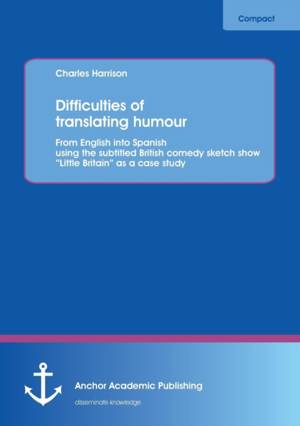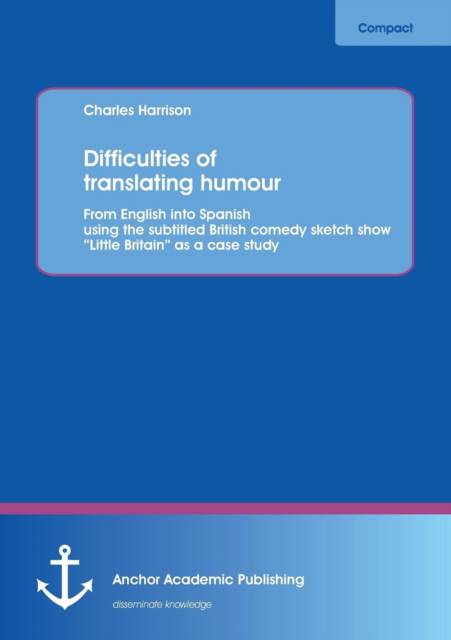
- Retrait gratuit dans votre magasin Club
- 7.000.000 titres dans notre catalogue
- Payer en toute sécurité
- Toujours un magasin près de chez vous
- Retrait gratuit dans votre magasin Club
- 7.000.000 titres dans notre catalogue
- Payer en toute sécurité
- Toujours un magasin près de chez vous
Difficulties of translating humour
From English into Spanish using the subtitled British comedy sketch show "Little Britain" as a case study
Charles Harrison
34,45 €
+ 68 points
Description
Humour is a complex concept which tends to build on the ambiguity of language. When converting a humoristic program into a different language, the translator thus faces many challenges. One of these is the translation of cultural aspects of the TL (target language). Since every culture contains its unique form of humour, understanding the humour within a culture and all its cultural elements is essential to producing an adequate translation. The study at hand focuses on the translation of the British comedy-sketch show Little Britain analyzing how it has been converted from its SL (source language), which is English, to its TL, which in this study will be Spanish. It proved to be highly constructive for the purposes of this research as the humour is often very culture-specific and thus difficult to translate. For the benefit of the reader, the first part of this dissertation is going to discuss various theories of humour. Moreover, it will discuss how humour is created in the comedy sketch show Little Britain. As subtitles will be used for the analysis of the case study, limitations and constraints will be discussed as the translator cannot merely focus on the linguistic features and possible problems like she/he would do in any other form of translation. Using Attardo's theory (1994), the study aims to explore aspects that create difficulties during the translation process, always in relation to humour that is seen in a comedy sketch show. It explores the translation of humour, examining potential problems that translators need to overcome and expands on this by investigating the difficulties that arise when translating culture-specific issues. In addition, as this is an audiovisual translation, potential problems that become relevant in the case study are highlighted. The study highlights the difficulties a translator faces within the process and, where relevant, possible alternative strategies that the translator could have applied in the translation process.
Spécifications
Parties prenantes
- Auteur(s) :
- Editeur:
Contenu
- Nombre de pages :
- 52
- Langue:
- Anglais
- Collection :
Caractéristiques
- EAN:
- 9783954890286
- Date de parution :
- 21-05-13
- Format:
- Livre broché
- Format numérique:
- Trade paperback (VS)
- Dimensions :
- 148 mm x 210 mm
- Poids :
- 81 g







